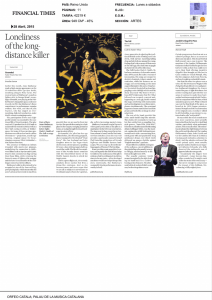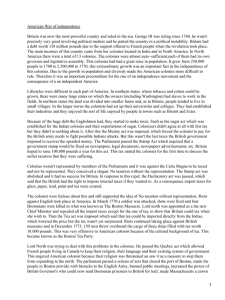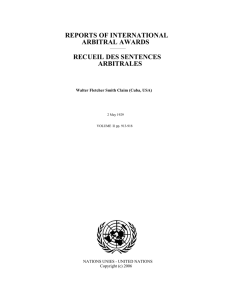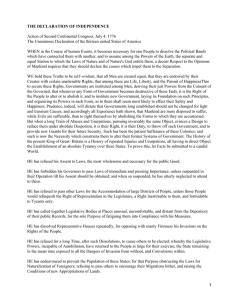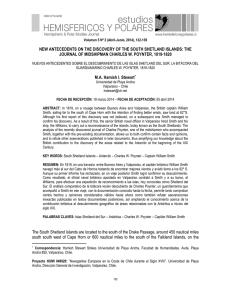DOCUMENTO DE TRABAJO 9202 POWNALL ON SMITH ON
Anuncio
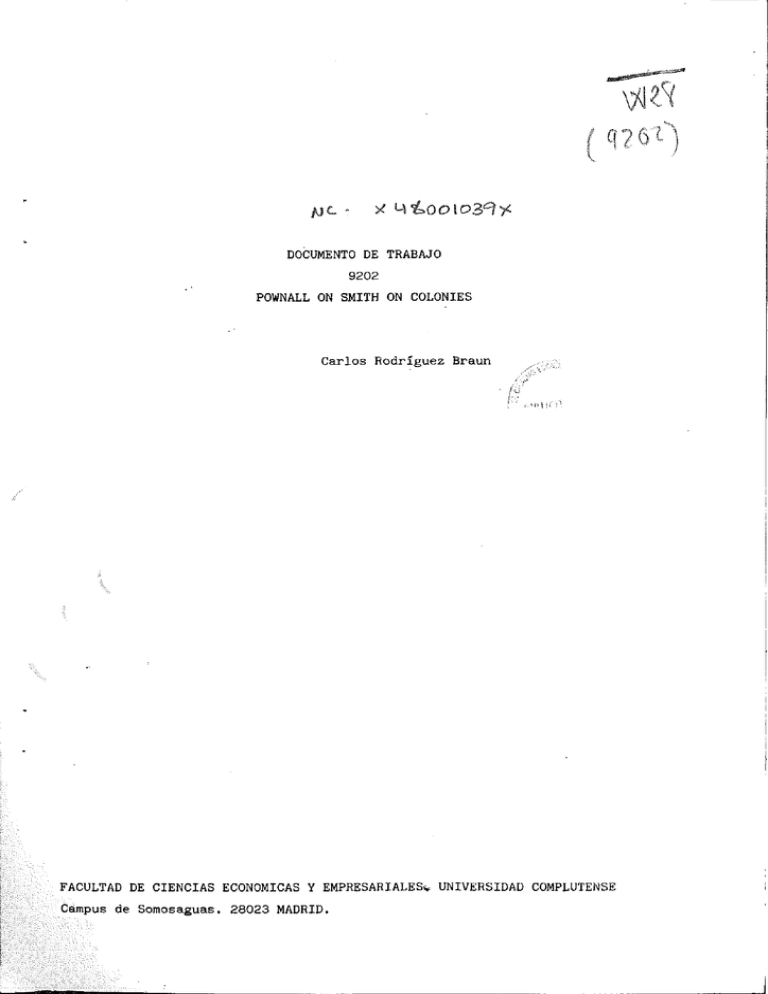
DOCUMENTO DE TRABAJO 9202 POWNALL ON SMITH ON COLONIES Carlos Rodríguez Braun FACULTAD DE CIENCIAS ECONOMICAS y EMPRESARIALES~ Campus de Somosaguas. 28023 MADRID. UNIVERSIDAD COMPLUTENSE POWNALL ON SMITH ON COLONIES Carlos Rodríguez Braun Universidad Complutense, Madrid As early as the Wealth of that may 1776, Thomas Pownall published a Nations in the form of us help analyse a a letter to much-debated review of its author, issue in our discipline: Adam smith's thought on colonies. Both friends and enemies of the empire the Wealth of Nations. Accordingly, Smith's subject have been pointed out by took comfort in ambiguities on the specialists, from Henry Brougham and Jeremy Bentham in the early days of the nineteenth century down to Bernard Semmel in 1970. 1 On argued later by the other hand, Donald winch and others have forcibly that Smith's imperial J.S.Nicholson and the for no more 'project', so heartily supported liberal imperialists, accounts than a ballon d'essai. 2 And the the history of ~conomic thought at present best textbooks in coincide in placing Comments by D.p.O'Brien, P.Schwartz, F.Cabrillo are gratefully acknowledged. and G.Tortella 1 Henry Brougham, An inquiry into the colonial policy of the European powers (Edinburgh, 1803), Vol.l,p.7¡ Jeremy Bentham, Economic writings, ed. W.stark (London, 1952), Vol. 1, p.194¡ Bernard Semmel, The rise of free trade imperialism (Cambridge, 1970), pp.27-29. 2 Donald Winch, Classical political economy and colonies (London, 1965), pp.16-17¡ cf. also his article "Science and the legislator: Adam Smith and after", Economic Journal, September 1983, p.505¡ A.W.Coats, "Adam Smith and the mercantile system", A.S.Skinner and T.Wilson (eds.), Essays on Adam Smith (Oxford, 1975), p.335. 2 Adam smith within the classical stream of hostility towards colonies. 3 The origin present in of the dispute lies the Wealth of Nations. economic value wider by of colonies division of monopoly and in two lines of argument Qne line stresses that the -a ¡arger market labour- can surpass the excessive regulations, possibility of substituting a new commonwealth, improving autonomy (representation that allowing for a huge costs imposed and contemplates the considerably, by value the imperial 'project', with + taxation) and free trade, for the old mercantile colonial system. The other line is the classical liberal one, emphasizing the costs of empires in a wide variety of items, political and economical: they for their stimulate wars defence. In such costs, and draw the end the metropolitan suffering more taxes and monopolistic markets. If the mother and the benefits price because controls, smuggling vast resources will be consumer pays for higher prices country imposes will fostered. prove The due to tariffs short-lived, best solution, accordingly, would be the freeing of these onerous appendices. 1 have dealt classical economics tried to prove most of extensively with this and the colonial question, that smith's faltering his successors should include Marx in issue in the my book on where 1 position was classical period have echoed by -and this as well. There is, consequently, no clear- 3 Mark Blaug, Economic theory in retrospect (Cambridge, 1985), p.59¡ Henry W.Spiegel, The growth of economic thought (Englewood cliffs N.J., 1971), p.357¡ D.P.Q'Brien, The classical economists (Qxford, 1975), p.288. 3 cut classical agreement in attitude towards keeping away colonies, from except in their the mercantilistic imperial Additional light can be shed on these matters by perusing system. 4 one of the Letter earliest reviews of the from Governor Pownall to Adam Wealth of Nations, the Smith. Thomas (1722-1805), former Governor of Massachusetts and colonial administration, published September, 1776, having studied the an expert in Letter in Smith's magnum Pownall London opus 'in in the retreat of the summer,.5 colonies are the Letter major preoccupation6 of Pownall of 1776, courteously written, and for in this which Adam Smith 4 Carlos Rodríguez Braun, La cuestión colonial y la economía clásica (Madrid, 1989). 5 Thomas pownall, A Letter from Governor Pownall to Adam Smith, L.L.D., F.R.S., being an Examination of Several Points of Doctrine, laid down in his 'Inquiry into the Nature and Causes of the Wealth of Nations' (London, 1776), p.3. 6 But not the only one. Pownall presents an interesting critique of Smith's views on the division of labour, the labour theory of value, and the issuing of paper money. Pownall has a subjective approach to value, and seems to have some understanding of money illusion. See Letter, pp. 4-23. 4 expressed thanks. 7 The his issue, as is obvious extensive chapter VII of book IV and the final of the Wealth of Nations,8 ranked also very from the pages of book V high in Smith's interests. After studying in in 1753. Later Cambridge, Pownall travelled to America he was appointed governor of Massachusetts in 1757 and of South Carolina in 1759, though he did not take this last an M.P. post: Afterwards controversialist, necessity colonies he he was appears of sorne kind of -an idea that was European liberals from that that the empire would evolve to have 1767-80. A perceived union between to gain great time onwards- but up noted early the and her Britain strength among to have feared towards an increased taxation of the colonies and a final revolution. 9 He did not favour the emancipation of the colonies, but 7 smith wrote a very polite letter to Pownall on 19 January 1777. Years later, however, he pointed out to Andreas Holt: '1 have not thought it proper to make any direct answer to any of my adversaries. In the second [1778] edition 1 flattered myself that 1 had obviated all the objections of Governor Pownal (Sic). 1 find however, he is by no means satisfied, and as Authors are not much disposed to alter the opinions they have once published, 1 am not much surprized at it'. A.smith, The correspondence of Adam Smith, edited by E.C.Mossner and I.S.Ross (Oxford, 1977) pp. 224, 250. But Smith does not seem to have introduced significant changes in his remarks on colonies in the successive editions of his book. Cf. Am Inquiry into the Nature and Causes of the Wealth of Nations, edited by R.H.Campbell and S.S.Skinner (Oxford, 1976), pp. 25, n.2, 50, n.15. 8 And many other published and unpublished material, such as his 1778 memorandum on the contest with America; cf. correspondence, pp. 380-5. 9 correspondence, p.213n. On Pownall cf. al so Dictionary of National Biography and Dictionary of American Biography. 5 seems caught up between the scylla in which he resists of the mercantil e to introduce vast liberal changes, and the Caribdis of his acknowledgement of absence great of empire, reforms the ( sad) fact that the bound were colonies in the for independence. To the empire issues administration of colonies, his major devoted he work, The published anonymously first London in 1764, but running afterwards in through five subsequent and enlarged editions under Pownall's name. It is no surprise, accordingly, to find him dealing at length with imperial matters in his Letter to Adam Smith. From the ( direct lO 'circuitous' confused them and with rapid trade attack on returns) and argues between and 'roundthat Smith system. 11 Only the colonial latter is to be condemned, because it implies the waste of labour and commodities old in his distinguishes Pownall (artificially expanded) about' the outset, unprofitable the are sent proverb referring charges more than detention to market by to a he should. of Tom Long carrier that AII other capital, as the carrier -the goes further and commerce, direct and with due and quick returns on capital, is advantageous. 12 The Letter argues accordingly the West India ships to call only against the obligation of at English ports, instead of 10 Circuitous trade may be interpreted as being indirect, but nonetheless worth the trouble if it adds lots of value in the sequence of exchanges along the way. 11 Wealth of Nations, II.v.28, p.370, n.23. 12 Letter, pp. 24-26. shipping directly at note that this AnalogouslY, foreign markets for the West should be done 'in British Americans should be permitted to go Spain, purchase there certain articles and to America -but, again, they should merchants'. Pownall proceeds to with carry them dire be purchased separate round-about trade and monopoly, never losing sight of the main thing: wherever the trade, monopoly would it should hath occasioned should this not take any such be relaxed; object colonies are place; to be a round-about and wherever it round-about operation, it always and end, create however keeping namely, that considered so as in view far as our an institution, established and directed to encrease the naval force of that force the operations of their monopoly, which our marine empire, and derives in any degree from commercial powers, engrafts so them upon indispensable, so far our far as that internal and ought never establishment, is to be departed from or relaxed. 13 Historians of economic the liberal elements In elements in in classical this regard support of matters he endorsed mercantilism it is noteworthy that Pownall eye to the Act of and the economics, particularly monopoly, sees thought have long recognized eye should with mercantilist in Adam smith. after this full-fledged state Smith, the Navigation precisely 13 Letter, pp. 26-27. both that in latter these having on the grounds that n 7 defence is opulence. 14 more important than not only wise but, judiciously applied, Monopoly is thus necessary. And Pownall sums up his eulogy of circuitous-trade with the colonies: the thing which of all others tends most to and extend the manufactures, provided should that course in American be trade in markets allowed its for and British encouraged, circuition an orbit that hath increase keeps its Great Britain for its center. 1S From the mid-eighteenth increasing wave for reforming relaxation of of opinion the the trade; in the case trade was century onwards, throughout Europe empires. strict The monopoly exception of precisely what about the view need favoured regulations one port, freer trade but still confined suggested the was an of a colonial of countries like spain, where the colonial restricted to of foreigners. In majority there the éclairées to nationals, to favoured a the exclusion the eighteenth century practically no emancipation of the Josiah Tucker. colonies, with the And Pownall argues Smith is aiming at, not only voice notable that this to break is up the monopoly privileges to companies but to dismember the empire. This prompt and author of hasty conclusion is very unlike 'the Treatise on it savours unpracticed more of surgeon, the puzzled who 14 Wealth of Nations, IV.ii.30. 15 Letter, p. 27. the wealth of is nations', inexperience of more the ready with an his 8 amputation knife, than prepared in the skill of healing medicines. 16 After disputing never furnished Smith's assertion that any military force, the the colonies have Letter goes on to tackle the question of monopoly and prices. 17 Freedom of colonial and lower prices, says trade should result in lower Smith. Possibly, with disagreeable consequences, prices could agrees Pownall, he adds. He argues that deprive England from necessary articles, would be taken by foreigners. Horeover, price down profits in the up the relative but lower that falls would drag mother country and colonies, but will push return of the highly corn-farms; the colonies will competitive markets in our American consequently switch from tobacco and other 'exotick' commodities to corn, European profits 'rivalling us at the home commodity, and to the depression of our agriculture' .18 Like most enemies of free consider the beneficial effects costs. The same applies artificially capital prof1t high from other rates in Pownall of a market in branches of the whole colony not expanded by lower trade, employment, economy higher by attracting keep prices than they and would occasion a change in direction rather than an actual addition to Britain's trade. In Pownall's view, 16 Letter, p. 37. 17 Wealth of Nations, IV.vii.c.64, p.614, n.49. 18 Letter, p. 40. does to his criticism of Smith's point that profits otherwise have been, and trade, 9 Smith ignored eighteenth the evidence. Foreign century, showing that Britain's trade had increased noticeably, and and activities the immensely.19 connected This may Pownall's statistical not have trade more in trade, done so perfectly true, but had imply that trade a freer the trade with Europe it, been answer does not increased even in that her colonial with well have figures could environment, as it happened in fact after his lifetime. In a second step, own ground. Even the Letter tries to if trade had with the division of labour, been diverted, what there is a division and one cannot engage in all trades. concentrate in the branch meet Smith on his of it? As of commerce, ls it not advantageous to where the most succulent to be reaped? lf a country can maintain a profit is monopoly on the most profitable channels it has surely commerce, acquired that which ascendancy is always better in trade understood and than explained. Pownall immediately sees that quantity and higher interests. He assuming a low finds the combination of price may be harmful for the solution, however, price-elasticity of the smaller the country's by explicitly demand for British exports: although those extent, yet enjoyas high [profit] raising the rates may profit of much, and produce in confine the the dealing, trade as we much, as if 19 Letter, p. 41. Another statistical dispute in Wealth of Nations, p.461, n.30. 10 we did more business of less profits. 20 of One channelling Smith's the opposing arguments of capital towards the colonial trade forceful was that it represents a distant trade, less beneficial than a trade with neighbouring countries, of because its collecting frequent return. Pownall replies that profit trade were roughly in line with a less rates in colonial profit rates in other monopolized trade, and that the capital employed non- in America is not unprofitable to Great Britain: like that for portion of the seed, it is harvest which is the matrix of a detained succeeding and encreased production; by operating to advance farther consequently the is creating and these population extending improvements, of these new countries, it for our productive labour calls forth that labour faster and to more a and advantage, returned and market, than the demands same capital directly vested in British goods could do; as it encreases this market in calls whose still forth more a constant progression, manufacturers; gives a it spring to agriculture; and extends the commerce of Great Britain. 21 Keep the trade and extend the market, was not this Adam 20 Letter, p. 42. It should be noted that it is not free demand inelasticity that Pownall is referring to but the closed, restricted trade with the colonies; high profit rates had little effect on total export demand because the colonies had to buy from Great Britain. 21 Letter, p. 43. Wealth of Nations, IV.vii.c.3B, pp. 601, n.IB, 602, n.21. l 11 smith's central find a theme after all? In fact, it misunderstanding of fails to notice that those diminished costs -it In other words, theory: Pownall, were Smith's is interesting knew sorne of the effects described them ably, Smith's was noto Here we goals provided to recall that of freeing a monopolized except the crucial one of Smith does not confusion underlies remark that the imperial Pownall cost-lowering. support every Pownall's bitter they market, and proposal artificial market-creation, regardless of the effect The again, of on costs. reaction at Smith's system was only appropriated for a nation of shopkeepers. 22 Taking up disturbs the idea that the excessively equilibrium one of its bOdies, artificially reasons to with made of the twelve of colonial economy, trade blowing treats with by smith fact in He mocks that the American colonies connection with Smith's five been an of the ad hoc interruption of had not up irony the 'convulsions, apoplexy, or death' expanded trade. 23 explain the the parts, Pownall organicist remarks about social the monopoly trade econornic 22 Letter, pp. 44-45. See also Wealth of Nations, IV.vii.c.63, p.613, n.46. In fact, Pownall (p. 44 n) misquotes Smith, who separates a nation of shopkeepers frorn a nation whose governrnent is influenced by shopkeepers. only if the case is the latter, Smith concludes rather sarcastically, then the old colonial system is fit. 23 Wealth of Nations, IV.vii.c.43. -~ 12 catastrophe. 24 Imperial commerce was, after all, not that important, because the productive powers of trade continue to be in some other actuated, and its circulation to channels, though our American run artery is obstructed. 25 This ideas passage that Smith colonies, "but by the to indirectly could have put actually did noto classical economists in prove the small economic Smith's theorem, now 'what indicates is annually two forward in his criticism of These ideas, widely associated with the the empire, regularly consumed the principIe that 'the general of never society can exceed what used were name of Turgot, that annually spent', and the employed discussing colonies, and importance of saved is as interconnected the as what is industry capital of the society can employ'. 24 Letter, p. 44. The five reasons were: 'First, those colonies, in preparing themselves for their non-importation agreement, drained Great Britain completely of all the tommodities which were fit for their market: secondly, the extraordinary demand of the spanish Flota has, this year, drained Germany and the North of many commodities, linen in particular, which used to come into competition, even in the British market, with the manufactures of Great Britain: thirdly, the peace between Russia and Turkey has occasioned an extraordinary demand from the Turkey market, which, during the distress of the country, and while a Russian fleet was cruizing in the Archipelago, had be en very poorly supplied: fourthly, the demand of the north of Europe for the manufactures of Great Britain, has been increasing from year to year for sorne time past: and fifthly, the late partition and consequential pacification of Poland, by opening the market of that great country, have this year added an extraordinary demand from thence to the increasing demand of the North'. Wealth of Nations, IV.vii.c.45. Smith remarked that all these events were transitory and accidental, except the fourth. 25 Letter, pp. 44-45. 13 This backs the hypothesis that Smith was, in fact, a less thorough anti-colonialist than ideas to be. The two might have been put into motion by Smith to answer a key economic question on colonies: what of the disappearance of the of what he appears Smith's empire? It is a ambiguous views matter -perhaps would be the because his that revealing feature he didn't dwell upon economic model, followed to its ultimate consequences, would have forced an extreme case, ignores Smith's standpoint. 26 anticolonialist these ideas, and indeed reasoning that consequence could have this through him to present pownall, in any disregards any part of favourably to looked colonies. 27 Pownall al so trade attracts only happen, because the high the capital away from he says, enlarged increase the that confronts at the activity objection that land improvement. This beginning in demand for agricultural profits won't push monopolized of colonial colonization, commerce goods. He also interest will rates will believes upwards. The Letter adopts a Keynesian tone avant la lettre the rate of the rates of interest does not necessarily depend profit made by money, but on on the 26 of course, one can argue that there is no 'economic model' in smith, in the sense of being fully separated from the political one, and say that precisely because Smith mixes both dimensions he does not conclude by proposing unilateral emancipation. 27 Wealth of Nations, II.iii.1S and IV.ii.3. Cf. also C.Rodríguez Braun, op.cit., pp. 51-2. It can be noted that the two ideas as such are really not destructive of colonies, if the point of the level at which savings are invested, and capital employed, in terms of profit, is not taken into account. 14 proportion quantity influx of demand which, of for the and the riches, use velocity of to the with which, the in consequence it of an advancing mercantile prosperity, brings into circulation. High absolute supply profits increase of money, and so the both the effect on demand for and the interest rates levels may be neutral. 28 Having met satisfaction, point Smith's economic criticisms Pownall ends bis Letter of empire to by admitting his Smith's that monopoly restrains economic activity, but accepting monopoly for political reasons. Pownall indulges at the outset in a mechanical metaphor: Any regulation which direction, and keeps in that operation, must gives check and motrix, with which the body a direct course. Just confines any body a confined line of direction destroy part as the off in central force, which commercial activity and off which requires the colony-trade to observe Great Britain as check in part of the which it would have flown from that orbit: So the monopoly, certainly vis to circulate round that center projectile force with of any of the moving would fly any given orbit, doth check and diminish doth course diminish with which it its center, part of is at all that points in exertion to fly off in a tangent. Political realism, that every country however, compels Pownall to recognize must assure its separate existence, 28 Letter, pp. 46-47. 'until 15 some commercial millenium machine loses speed and this shall melt particular. the into one'. when its direction is forcefully the same happens when trade is damages down all world On the at altered, artificially oriented. But large, contrary, she A not Great derives Britain from her in colonies 'force, revenue and every commercial advantage'. 29 Thus the Letter concludes. One might legitimately ask, whatever happened to the pro-colonialist Adam Smith? According to Pownall imperial project, later, he hailed there is no as extremely totally disregards as such persono Smith's important one century unrealistic, bearing in mind the strife that was going on in America: 1 should here have proceeded to your plans of the Britain should America; all but adopt in discussion shall ever ground of colonial may then be present now at think laya state of on that Great towards events suspends head. rational, If future sound and true government, the proposing of such shall not be withheld. At jacta est alea, the fate of this country is proper, and the hazard reason, is to here which you her future conduct the present political events system, the consideration of of events, decide. 1 am about things 29 Letter, pp. 47-48. 30 Letter, p. 48. afraid we which once dear, but are no more. 30 which force, and were, not are reasoning and were most 16 Pownall would then Smith discount 'project', as stand with modern pro-imperialist said above, is commentators Smith's view. merely a ballon who imperial d'essai and should not be taken seriously. This loose interpretation ends. If dismemberment Adam of is plausible, Smith the was empire, but really why it in didn't leaves sorne favour he use of the all his theoretical ammunition against it? If he really was against the preservation of the colonial link, why did he go into the trouble of proposing an project? Smith's liberal He himself imperialism may be reckoned Utopian. says so explicitly. But mark that the possibility of a universal free would not be sensible to imperial trade as he had spoken of Utopian -and it argue that because of that he wasn't in favour of free trade. 31 A more reasonable view is to accept that one may speak of the empire in more than one Letter is very much A possible of sense, and to this view a propos. answer to why Pownall completely ignored Smith's support for the colonies -a all hidden in the Pownall's all support that is not at Wealth of Nations- is that Pownall perceived , that smith and himself Smith was not against were talking about different any conceivable empire: what he (and for that matter all his classical successors, as the main target things. for criticism was Marx included) chose the mercantilistic 31 It is interesting to recall that the word utopia appears only twice in the Wealth of nations, in connection with free trade and the imperial union: see IV.ii.43 and V.iii.68. 17 empire. And that was precisely Pownall's empire, the one he had administered, and in which he was not prepared to admit so great a change as he saw advocated in the Wealth of Nations. The fact that Pownall saw Smith as his opponent the future , of the colonies is because they appeared to be on both preferred illuminating in this by the legislative America. Moreover, Smith followed in several imperial ideas, regard, the same side, insofar as an empire reinforced between Britain and regarding they union Pownall among them the eventual move of the empire's seat to America. 32 They aiming differ, however, at a new empire, while old one, with sorne of them of in one Pownall wants point. Smith is to maintain the minor reforms. And history would prove both right. The renewed British smith's critical ideas. And the empire would empire cherished take up sorne by Pownall was coming indeed to an end. 32 A.Smith, Correspondence, pp. 379-80, and Wealth of Nations, IV.vii.c.79. Thomas pownall, The Administration of Colonies, 4th. ed. (London, 1768), pp. 37-9, 168. The moving of the empire seat accross the Atlantic could have been taken also from Benjamin Franklin, who was associated with pownall, visited Great Britain during the preparation of the Wealth of Nations, and met Hume and smith. Years later, on a demographic basis, Jeremy Bentham would present a similar possibility with regard to Spain. Cf. C.Rodríguez Braun, op.cit., pp. 48-9, 534, 128, and A.Smith, Correspondence, pp.379-80.
